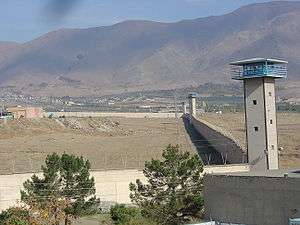Gohardasht Prison

Gohardasht Prison (Persian: زندان گوهردشت) is a prison in Gohardasht, a town in the northern outskirt of Karaj, approximately 20 km west of Tehran.
Sometimes spelled Gohar Dasht Prison, it is also known as "Rajai Shahr", Rajaishahr, Raja’i Shahr, Reja’i Shahr, Rajayi Shahr, Rajaee Shahr, Rajaei Shahr or "Rajaï Shahr Prison", etc. and sometimes as Karadj or Karaj prison (but Qezel Hesar prison is also near Karaj). In Google Maps it is listed as "Rajai-Shahr Prison, Karaj, Tehran, Iran".
Political prisoners and prisoners of conscience tend to be sent to Ward 12 of Rajai Shahr.[1]
Rajai Shahr is regarded as one of Iran's harshest jails because of its many reported cases of torture, rape and murder.[2][3]
IRGC has solitary confinement cells in Rajai Shahr Prison.[4]
In the immediate aftermath of the Islamic Revolution, there were many systematic executions and interrogation of former members of the overthrown monarchy, military.
During the 1980s, members of the liberal Marxist and socialist groups (mostly university students) and supporters of The People's Mujahedin of Iran who opposed the theocratic regime were imprisoned and many of them were executed. Mass executions of political prisoners, in particular in Gohardasht and in Evin, took place during the 1988 executions of Iranian political prisoners.[5]
Imprisoned student activist Majid Tavakoli was transferred to Gohardasht Prison in August 2010.[6]
In June 2012, the organization Campaign to Free Political Prisoners in Iran raised a serious concern with EU Parliament representatives on the situation of political prisoners in Rajaee Shahr: ailing political prisoners are deprived from urgent medical attention, putting their life at risk.[7]
On September 13, 2015, Iranian union activist Shahrokh Zamani died while imprisoned here.[8][9][10]
Amnesty International spoke out against the prison's practice of blinding prisoners in eye for an eye justice in 2015.[11]
Oct. 2016: Political prisoners protest against violations of their basic rights, causing various harms and health challenges and leading to their slow death.[12] The quality of food has decreased recently to the point that many of the prisoners are suffering from malnutrition.[13]
References
- ↑ Farshid Fathi Transferred to Ward 12 of Rajai Shahr Prison
- ↑ ANTI-MULLAH 12 May 2011
- ↑ Iran jails women journalists - The Guardian 11 Sep. 2012
- ↑ "IDeath Row Sunni Prisoners Beaten by Prison Guards in Solitary Confinements". HRANA. 2 August 2016. Retrieved 10 August 2016.
- ↑ Iran: Violations of human rights 1987 - 1990
- ↑ "MAJID TAVAKKOLI, IMPRISONED STUDENT LEADER". Amnesty International. Retrieved 17 April 2011.
- ↑ Campaign to Free Political Prisoners in Iran: CFPPI Meets with EU Parliament 18 June 2012
- ↑ "IRAN: DEATH OF TRADE UNIONIST MUST TRIGGER ACTION TO TACKLE APPALLING PRISON CONDITIONS". Amnesty International. 25 September 2015. Retrieved 27 June 2016.
- ↑ "Jailed Iranian Union Activist Reportedly Dies In Prison". Radio Free Europe/Radio Liberty. 14 September 2015. Retrieved 27 June 2016 – via Radio Free Europe / Radio Liberty.
- ↑ "Imprisoned Labor Activist Dies of Stroke after Being Denied Medical Care". International Campaign for Human Rights in Iran. Retrieved 27 June 2016.
- ↑ Andrew Marszal, and agencies (6 March 2015). "Iran condemned for 'unspeakably cruel' blinding of prisoner". telegraph.co.uk. Retrieved 28 June 2016.
- ↑ Prison conditions in Iran cause slow death of prisoners radiozamaneh, October 18, 2016
- ↑ Mafia Ruling Rajai Shahr Prison, and the Increasing Difficulties the Prisoners Face hra-news 25 Oct. 2016
See also
- 1988 executions of Iranian political prisoners
- Tudeh Party of Iran: Suppression
- Persecution of Bahá'ís
- Evin Prison
- List of prisons # Iran
- Human rights in Iran # Notable prisons
- Judicial system of Iran #Prison system
- White torture # Iran
- Mahmoud Ahmadinejad # Human rights
Coordinates: 35°52′05″N 50°58′44″E / 35.8681°N 50.9789°E